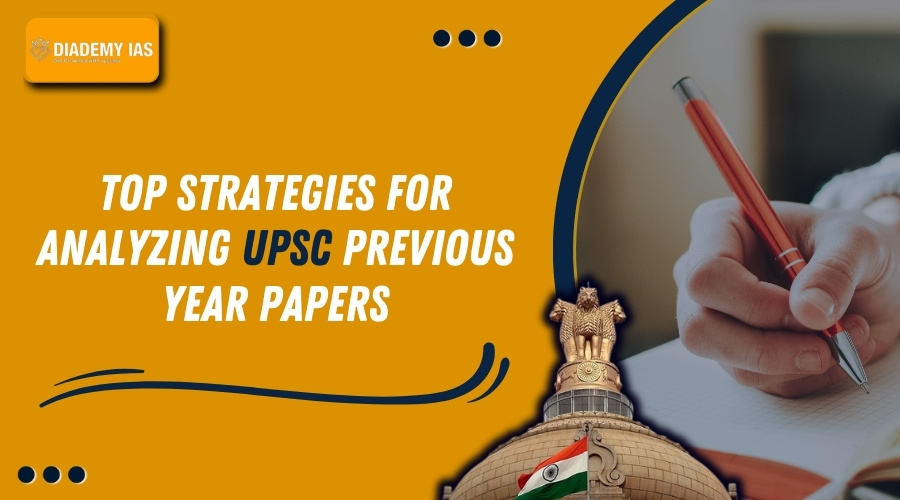Top Tips for Analyzing UPSC Previous Year Papers
Unlock the secrets to cracking the UPSC exam with our expert guide on analyzing previous year papers for success.

Confused with UPSC Preparartion!
Don't worry, contact Diademy for exclusive tips and resources.
Table of Contents
Introduction: Understanding the UPSC Exam
The UPSC Exam is a very important test in India. It stands for the Union Public Service Commission Exam. This exam is like a key that opens the door to exciting and prestigious jobs in the government. When someone passes the UPSC exam, they can become a government official, which means they get to help make decisions that affect many people's lives.
Confused with UPSC Preparartion!
Don't worry, contact Diademy for exclusive tips and resources.
What is the UPSC Exam?
So, what exactly is the UPSC exam? It's a big test that checks how much knowledge and skill a person has. This exam is not just about knowing things; it also measures how well someone can think and solve problems. Many people study hard for this exam because it is known to be challenging. Each year thousands of students take this test, hoping to secure a good position in the Indian government.
Why is the UPSC Exam Important?
The UPSC preparation process is crucial as it leads to important jobs. When someone passes the UPSC exam, they can work in various roles like an IAS officer, IPS officer, or IFS officer. These jobs are not only respected but also come with a lot of responsibility. Those who succeed in this exam can make a real difference in their communities and the country. That’s why many students feel it is worth the effort to prepare and do their best on the UPSC exam.
Effective Strategies for UPSC Preparation
Having a study plan is like having a road map for your UPSC preparation. It helps you know where to go and what to study every day. A good plan should include all the subjects you need to learn and the time you will spend on each. Try to break your study time into smaller chunks. This way, you won't feel overwhelmed and can stay focused. Remember, it’s important to have breaks too. They help your brain relax and remember things better!
Using Quality Study Materials
Using the right study materials is very important for your UPSC preparation. Good books and resources can make learning easier and more enjoyable. Look for books that are recommended by teachers or other students who have passed the exam. Online resources can also help, but make sure they are reliable. Quality study materials will help you understand the topics better and prepare you for the types of questions you might face on the exam.
Analyzing Previous Year Papers
Looking at previous year papers is a smart way to get ready for the UPSC exam. These papers show what kinds of questions have been asked before. By studying them, you can spot patterns and understand what the examiners are looking for. This can make your UPSC preparation much more effective!
Why Look at Previous Year Papers?
UPSC Previous year papers are like treasure maps. They help you see the topics that often come up in the exam. You can find out which subjects are important and focus more on those. For example, if you notice many questions about a certain topic, you should pay extra attention to it when you study. This way, you can feel more confident on exam day.
How to Analyze Past Papers
To analyze past papers well, follow these steps:
First, gather a few previous year papers. You can find them online or in study books. Next, try to solve each question on your own. This will help you understand how much you know about each topic.
After attempting the questions, check the answers. Look closely at the questions you got wrong. Try to understand why the right answer is correct. This can help you learn from your mistakes.
Finally, make a list of the topics that are frequently asked. Use this list to guide your study plan. Focusing on these areas can boost your confidence and improve your chances of doing well on the UPSC exam.
Study Techniques for UPSC
When studying for the UPSC exam, using the right study techniques can make a big difference. These techniques help make learning easier and more effective. Here are some strategies that can help you in your UPSC preparation.
Active Reading
Active reading is all about being involved with what you’re reading. Instead of just looking at the words, try to think about what they mean. Ask yourself questions as you read. For example, “Why is this important?” or “How does this connect to what I already know?” This helps you understand and remember better. You might even want to underline or highlight important points. This way, you can easily find them later when you review.
Making Notes
Another great technique is making notes. When you write things down in your own words, it helps you remember them better. Try to summarize what you’ve learned after reading a chapter or a lesson. You can create bullet points, diagrams, or mind maps. This makes studying more fun and allows you to see the main ideas clearly. Plus, these notes can be super helpful when you’re getting ready for the exam!
Practicing Exam Strategies
When it comes to taking the UPSC Exam, having a good plan is super important. Practicing the right exam strategies can really help you do your best. Let’s look at two key strategies: Time Management and Mock Tests. These will prepare you for the actual exam day!
Time Management
Time management is all about using your time wisely during the exam. The UPSC Exam is long, and each section has a different number of questions. You’ll need to divide your time among the sections. A good way to do this is to set a timer for each part. For example, if a section has ten questions and you have one hour, try to spend about six minutes on each question. This way, you won’t run out of time!
It’s also smart to keep an eye on the clock while you work. If you find yourself stuck on a question, it’s okay to move on and come back later. This helps make sure you answer all the questions you can. Practice managing your time when you take practice tests. This will help you feel more comfortable when it’s time for the real exam.
Mock Tests
Taking Mock Tests is another great way to prepare for the UPSC Exam. Mock tests are practice exams that help you get ready for the actual test. They can help reduce anxiety and improve your performance. When you take a mock test, try to make it feel like the real exam. Find a quiet spot, set the timer, and don’t use any notes or books!
After you finish a mock test, review your answers. Look for questions you got wrong and try to understand why. This is a great way to learn and get better. You can also practice writing essays if your exam has that part. The more you practice with mock tests, the more confident you will feel when taking the UPSC Exam.
Conclusion: Recap and Final Tips
As we wrap up our discussion on UPSC preparation, let's quickly go over the main points. First, creating a solid study plan is key. This helps you manage your time better and ensures you cover all topics needed for the UPSC Exam. Next, using quality study materials is vital. Good books and resources can make a big difference in your understanding. Also, analyzing previous year papers is an effective strategy. It shows you the types of questions you might face. Remember to practice active reading and make notes to help retain information. Finally, practicing exam strategies like time management and taking mock tests can improve your performance and reduce anxiety on exam day.
Final Tips
Here are some final tips for your UPSC preparation. Firstly, start early! The sooner you begin, the more time you’ll have to study everything. Secondly, stay organized. Keep your study space tidy and your materials in order. This helps you focus better. It’s also important to take breaks. Studying for long hours without a break can make you tired and less effective. Remember to stay healthy by eating well and getting enough sleep. Lastly, stay positive! Motivation is crucial during your preparation journey, so keep encouraging yourself. You can do it!
Confused with UPSC Preparartion!
Don't worry, contact Diademy for exclusive tips and resources.
Frequently Asked Questions (FAQs)
How early should I start preparing for the UPSC exam?
It's a great idea to start preparing for the UPSC exam early! Many students begin their preparation about a year or even two years before the exam. This gives you plenty of time to study all the subjects and review important topics. Starting early helps you avoid rushing and allows you to learn slowly and thoroughly.
What are the best books for UPSC preparation?
When it comes to UPSC preparation, using the right books is super important. Some popular books to help you study include "Indian Polity" by M. Laxmikanth for understanding the government, and "NCERT books" for basic subjects like history and geography. You can also check out "Economic Survey" for current affairs. These books are recommended by many successful students and can help you cover the required topics well.
How can I stay motivated during my preparation?
Staying motivated while preparing for the UPSC exam can sometimes be tough. One way to help yourself is to set small goals and celebrate when you achieve them. You could also study with a friend or join a study group, which makes learning more fun. Remember to take breaks and do activities you enjoy. This will keep your mind fresh and help you stay positive throughout your preparation.



